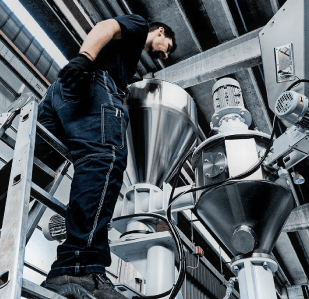Brief summary
In the vast world of food processing, technological decisions can make the difference between a successful and an unsuccessful product. In this article, we will explore the differences between hot and cold extrusion and how these can influence production in food processing.
Food extrusion technique: what is it and what does it produce?
Food extrusion is a widely used industrial process in the production of food that involves pressure and mechanical force to turn ingredients into a desired shape. This method is versatile and can be used to produce a wide range of food products, from breakfast cereals to snacks and even protein bars.
Differences between hot and cold extrusion
Hot extrusion is a process that requires high temperatures to shape and transform ingredients. Cold extrusion, on the other hand, uses lower temperatures during the process. The cold technique is often preferred when preserving the basic ingredients is a priority and cooking is not required.
We will now analyze the main differences between hot and cold extrusion:
-
applications: hot extrusion is widely used for snack and cereal products, while cold extrusion lends itself well to the production of foods such as protein bars and wholegrain cereals;
-
production costs: despite requiring high temperatures, hot extrusion is more economical in some applications due to the speed of the process.
The choice between hot extrusion and other food processing techniques depends on the specific characteristics required for the end products. Here are four reasons to choose hot extrusion for food processing:
-
Crispy texture: hot extrusion is particularly suited to producing foods with a crispy texture. This process creates products that satisfy consumer desire for crispy textures, such as snacks and breakfast cereals.
-
Rapid cooking: the high temperature used in hot extrusion cooks things quickly. This speed can be beneficial in situations when you want to reduce production times without compromising product quality.
-
Wide variety of shapes and formats: hot extrusion offers flexibility in creating a huge range of shapes and formats. This allows companies to respond more dynamically to market trends and consumer preferences.
-
Energy efficiency: it can be more efficient from an energy perspective than other processing techniques. Rapid cooking at high temperatures can reduce the overall production time and, consequently, energy consumption.
Take your food production up a level with Bausano: the art of premium extrusion!
In the food industry, extruders are vital pieces of equipment. Among the options available, Bausano’s E-GO single strew extruders and MD twin screw extruders stand out thanks to their versatility and performance.
Also in the food sector, Bausano’s laboratory extruders play a fundamental role. By mixing soft mixed ingredients through an opening in a perforated plate or die, the Bausano extruder shapes the food according to the desired shape, cutting it to the required size.
Contact Bausano for tailormade advice and find out how our extruders can take your food production to the next level.






